In my life this week:
Miss Beth, age 5, had a rheumatology check-up for Juvenile Rheumatoid Arthritis, resulting in no change in her medication. They agree that her knees and left ankle are more swollen than we'd like, but because her range of motion is still good and she doesn't get stiff after periods of inactivity, all is well for now.
A new garbage disposal was installed this week, as well as a clothes dryer and dishwasher, so my life has gotten easier. Praise God. Women of the past couldn't formally homeschool their children because daily life tasks - plucking chickens and doing laundry with a washboard and making butter and cream and mending and ironing - took all day long and probably into the night.
They taught their children plenty that was central to their moral and spiritual make-up. Everyone worked hard. Girls could cook, clean, grow food, quilt, mend and sew. Boys could hunt, mend fences, trap animals, plow land, sow seed, and sell at the market.
I don't know that we're better off now than folks were during the 1800's - there's something to be said for hard labor - but I am grateful for conveniences. Since the dishwasher was installed, I've found more time to do lessons with my first grader, and finally, I don't have to worry about showers and laundry taking all the hot water away at dishwashing time. Handwashing the dishes - something I've done since last April - meant that the germs just weren't getting killed.
And the crazy weather? One day this week we had so much snow that the local schools were out. Two days later we had rain and thunder. Yes, thunder. In Ohio. In February.
In Our Homeschool This Week:
I am just so pleased and blessed that we use Sonlight curriculum. The boys are learning so many facinating things, and I see their enthusiasm and love for learning really growing.
In The History of Medicine, they learned that women died in childbirth in large numbers because the doctors refused to wash their hands before delivery. Women developed infections and fevers and died. In one particular hospital the death rate was 4 out of 5. Washing their hands was undignified, in the doctors' minds. Midwives commonly washed their hands, so women fared much better under their care.
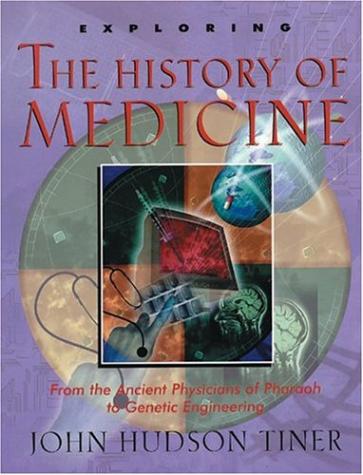
The boys couldn't understand the callousness of the doctors, after a smart new doctor discovered the benefit of handwashing and shared it with his collegues. They hated this guy, especially after he discovered that washing hands with soap and water, and then dipping them in a chlorine solution, saved even more womens' lives. The promising doctor was eventually ousted (other doctors cheered when he left).
William Carey: Obliged to Go, about a famous missionary to India, is another fascinating read. Carey, an Englishman, lived from 1761 to 1834.
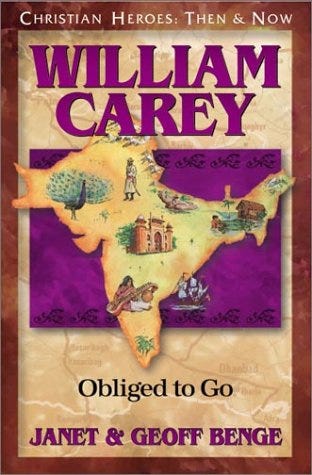
Known as the father of modern missions, he was one of four founders of The Baptist Missionary Society, and had a gift for languages and translation. He had a bright, focused mind, and God gifted him in specific ways.
In England at that time - and other places around the world - winning souls was considered God's job, not a believer's job. William had to pen a well-researched book about winning souls - the first of its kind -before receiving any support from churches in his work. Even then, his support revolved around 3 like-minded English men, whom his book profoundly influenced.
While Carey is the star of this book, his wife gave me the most pause as I read.
It was April, 1793, when Carey (32 years old) left England for India, after many setbacks and struggles. He was accompanied by his wife and four sons (one of whom was a newborn), and his sister-in-law, and another family.
Sadly, not long after arriving in India, his wife suffered a setback of horrible depression and had a nervous breakdown from which she never recovered (after losing her 5-year-old son; she previously lost two daughters). Dorothy Carey wasn't equipped emotionally, spiritually, or mentally to be a missionary. She was illiterate when William married her, and intellectually, she was never close to his equal. (His second wife was his intellectual equal, though she was an invalid when he married her, her legs having been maimed in a fire whe she was a child, and her lungs damaged. Charlotte only lived for 14 years after their marriage, but they were happy years for the couple).
William loved his first wife, Dorothy, but he had no idea how to help her. In that era, of course, there were no meds for depression. Dorothy ended up deranged and had fits of rage, frightening her boys and her husband; they confined her to her room, but her husband refused to ever put her in an asylum (which, later, other missionaries advised him to do).
Roughly six or seven years after Carey and his family begin the groundbreaking work in India, new missionaries were sent from England to help. For Carey's family, the most helpful addition was Joshua Marshman, a former school teacher. Joshua and Mrs. Marshman were appalled at the uneducated, undisciplined state of Carey's boys, who had been neglected by their depressed mother and overly busy father. Mrs. Marshman took the boys under her wing and cared for Mrs. Carey in her final few years as well - while at the same time helping her husband, Joshua, in his missionary work.
While God provided for William Carey, I have to wonder what the Lord was thinking in having him marry Dorothy. She didn't want to go to India, or even be a missionary family, for that matter. She was pregnant at the time the call and support came, and couldn't fathom how she would manage a long ocean journey. She was angry William even suggested it, after she'd already lost two daughters (her only daughters out of seven birthed children; only four children survived to adulthood).
Carey left once, bound for India, leaving Dorothy to live with her sister, supported by the church he pastored before being commissioned (though the church was too poor, really, to support Carey's wife and sons).
Quite reluctantly, then, Carey said goodbye and took his oldest son with him, but a series of setbacks in their monetary support brought the father/son pair back home before sailing to Calcutta (immediately following the new baby's birth). Carey and a missionary society founder were able to convince Dorothy to come, but only because her sister agreed to come and help with the children.
The sister fell in love in India and married, and Dorothy felt alone. What a tragedy her life was! All the sorrow over the death of her children, and feeling alone in a foreign land, with a husband fully focused on learning languages, writing Bibles and working for the Lord. As I read, it occured to me that the Lord sacrificed this woman's life for the good of the Gospel. Surely God could have had Carey marry a woman born to be a missionary? For example, Joshua Marshman's wife was as much a missionary as her husband.
William's early beginnings: William Carey was raised in the Church of England (his father had a low, poorly-paid position in the church). Later, William became a "dissenter", which I believe was the word used for evangelical at that time.
Dorothy and William married very young, when William was an apprentice to a cobbler, making little to nothing. He took his bride into an inadequate, damp, cold cottage, and they barely had enough to eat. As a result, they lost their first child, a daughter, to illness when she was 18 months old, which began Dorothy's depressive cycle.
William read a lot and learned he had a gift for languages, though he never had more than an elementary education. The cobbler he worked for decided to support Carey so he could study more - William's cobbler skills being poor, compared to his intellectual and spiritual potential. Soon after, William began pastoring small, poor churches. No matter how much help the Lord brought, the family was always poor (Carey also taught in a local school on the side, briefly, and rather unsuccessfully).
So many questions came to me as I read this book. How young and how poor is too young to marry, in God's eyes? Can a boy of 18 or 20, who can't really support a wife, much less a first baby, marry with God's blessing? Marrying young and poor in the working classes was commonplace at one time, but we strongly discourage it now. Usually children are told to finish college before marrying, and marrying young is (almost) universally discouraged. Are we wrong in this, or was Carey's way wrong? Does God even care what age we marry, or with what resources we enter the covenant? Certainly delaying marriage means more young people engage in sexual sin before their weddings (the vast majority, in fact). Is it best to struggle together in the early years, rather than delaying marriage?
Soon after the death of the first child, in the wake of Dorothy's depression, Carey's mother visited the young couple, while William was still an apprentice. Learning of the appalling conditions her son and daughter-in-law lived in, she went back home (a day's walk away) and solicited donations from neighbors to acquire a better cottage for the young couple.
Why didn't William seek help sooner from someone, so that his daughter could be saved and his wife could be less hungry? His parents didn't have much money either, but they could have gotten him help.
Every hero has his flaws - for isn't Jesus the only true hero? - and as I read, it appeared William's neglect of his family was definitely his major flaw. It wasn't that God didn't provide, but the providing seemed too little and often too late for Dorothy and the children (or was their struggling just part of God's story here?).
William did great things for the faith, and for God, but the Lord never made it easy. From day one William's work was a terrible struggle (outside of his giftedness for it), with more set-backs than I can count. His incredible focus and forward-thinking were more than commendable.
I have to say, the struggling and setbacks were similar for each missionary we've learned about, although William Carey's was the most desperate family situation.
I suspect Dorothy was not an evangelical, and that William was too young in his faith to recognize that, or to care. Women were not involved in their husband's work in that era; their roles were entirely domestic, so I guess William didn't realize the care with which he should choose a wife?
Or was it all to prove that with God, great things can happen, no matter our flaws, shortcomings, or poor decisions? Was it all to show that personal happiness and comfort (Dorothy's and her children's) mean little to God? Or did Dorothy reject God at some point, worsening her condition and ultimate happiness?
William is indeed one of the great heros of the faith, and his extreme hyper-focus on learning languages, translating Scripture, and winning souls, brought about many great beginnings. His missionary society was credited at the end with the saving of 700 souls through their India outreach, and though that may not sound impressive for over forty years of work, having a Bible in their own language would later save many more Indian souls, no doubt. William was also instrumental in outlawing two barbaric human sacrifice practices towards women and children in India.
Convicing people to break caste in India was the major obstacle to winning souls there. The first conversion of a native came years after the work in India began - this delay being the major work-related discouragement for Carey at the time.The caste system is deeply entrenched and oppressive in India (and it still is today).
As you can tell by the lengthy writing here, the William Carey reading fascinated all of us these last couple weeks. You can learn more about Willliam Carey here.
Other school news:
I am loving the Saxon First Grade Math program for my Mary. It's very well organized and engaging, and builds upon itself wonderfully. The only drawback is the cheapness of the paper, which is thin newsprint. It was an expensive package (for me, anyway), but worth it. We had to buy it late in the year, due to lack of funds, but I had other materials to use while waiting.
Notable Library trade books to share (featuring Caldecott Medal Winners this week):
The Glorious Flight by Alice and Martin Provensen
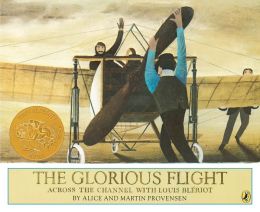
Overview : "This book...recounts the persistence of a Frenchman, Louis Bleriot, to build a flying machine to cross the English Channel.... The text is succinct, caption-like in its directness and brevity....The paintings...add the necessary testure and tone to this marriage. This is vintage Provensen" – School Library Journal
_______________________________________
They Were Strong And Good by Robert Lawson
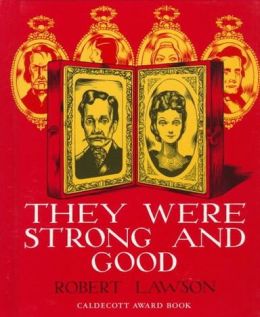
Overview: Awarded the Caldecott medal in 1941, They Were Strong and Good is a classic book that follows the path of one family's journey through American history. Robert Lawson introduces us to his forefathers and with them we brave Caribbean storms, travel to the wharf markets of New York, and fight in the civil war. Amidst these adventures Lawson's grandparents meet, marry and raise a family, and later his parents follow the same cycle of life. But this book is more than just a story of one family, it's a social history of our country. It reminds us to be proud of our ancestors -who they were, what they did, and the effect they had on the nation we live in today.
______________________________________
Dear Brother, by Frank Asch and Vladimir Vagin
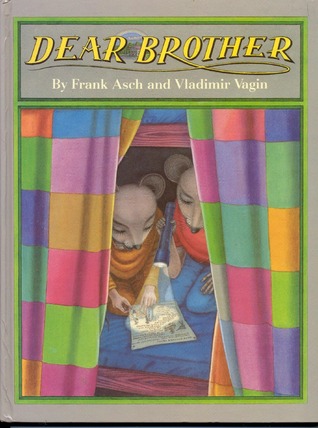
Overview: Two brothers discover dusty old letters written by their great-great-grand uncles to one another. Each letter paints a fascinating visual and verbal portrait as the brothers struggle to understand each other's lifestyle, and to realize that they are not so different after all. By the author-illustrator team of Here Comes the Cat!. Full-color illustrations.
______________________________________
Make Way For Ducklings by Robert McClosky
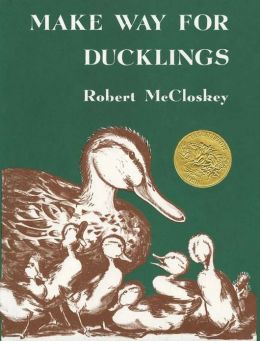
Overview: The busy Boston streets are too dangerous for eight little ducklings! But with a little help from a friendly policeman Mrs. Mallard and her family arrive safely at their new home. The public garden was no place for ducklings when they were first born, but now they are old enough to brave the raucous crowds and swim with the giant swan boats. Available for the first time in a full-size paperback edition, this Caldecott winning classic continues to delight generations of children.
_____________________________________
Time of Wonder by Robert McCloskey

Overview: The spell of rain, gulls, a foggy morning, the excitement of sailing, the quiet of the night, the sudden terror of a hurricane, and the peace of a Maine island as a family packs up to leave are shown in poetic language and vibrant, evocative pictures.
Follows the activities of two children spending their summer vacation on an island off the coast of Maine.
Children's Favorite Things This Week:
~ Making snow forts
~ Crafting a snowhill in the yard for sledding
~ Going sledding with Daddy last weekend
~ Making homemade pudding (Peter)
~ Making oatmeal chocolate-chip bars (Paul)
~ Having new appliances installed and having a Christian man (by chance) come to install them, who was enchanted by the idea of homeschooling as he observed us shortly for two days.
~ The giant appliance box they've been playing house in.
~ Working with a large, world map puzzle
My Blessing (gratitude) List:
~ Homeschooling with Sonlight history, language arts, and science
~ Added convenience in my housekeeping.
~ Kids who understand the importance of missionary work, and are beginning to comprehend the great personal sacrifice involved, and that God doesn't guarantee our happiness as we dedicate our lives to Him.
~ Library books to delight us
~ Siblings to delight each other
~ Behavior and problem-solving strategies to use with my ADHD/OCD son
~ Some emotional healing and affirming of a difficult choice
~ A good report from the rheumatologist
~ Our Compassion children to love, pray for, and write to
~ A plane ticket booked for my husband to visit his 91-year-old father, finally
~ Comfort Bible verses
Scripture to Share:
Isaiah 55:8-9
“For my thoughts are not your thoughts,
neither are your ways my ways,”
declares the Lord.
“As the heavens are higher than the earth,
so are my ways higher than your ways
and my thoughts than your thoughts.
After reflecting on William Carey and his family, this verse has been on my mind a lot lately.
How was your week, friend?


2 comments:
Ah the dishwasher! I thank God every time I use it. You sound like you have an awful lot on your plate. I am praying for you.
Sandy
A lot on my plate is a true statement. Praise God for the prayers of others and how I covet them! Thank you, dear friend.
Post a Comment